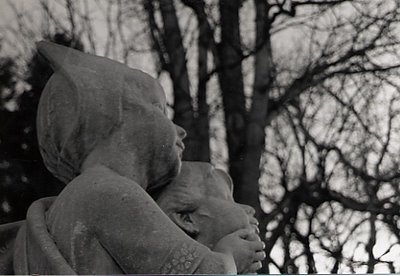Wynken, Blynken, and Nod one night
Sailed off in a wooden shoe,--
Sailed on a river of misty light
Into a sea of dew.
"Where are you going, and what do you wish?"
The old moon asked the three.
"We have come to fish for the herring-fish
That live in this beautiful sea;
Nets of silver and gold have we,"
Said Wynken,
Blynken,
And Nod.
The old moon laughed and sung a song,
As they rocked in the wooden shoe;
And the wind that sped them all night long
Ruffled the waves of dew;
The little stars were the herring-fish
That lived in the beautiful sea.
"Now cast your nets wherever you wish,
But never afeard are we!"
So cried the stars to the fishermen three,
Wynken,
Blynken,
And Nod.
All night long their nets they threw
For the fish in the twinkling foam,
Then down from the sky came the wooden shoe,
Bringing the fishermen home;
'T was all so pretty a sail, it seemed
As if it could not be;
And some folk thought 't was a dream they'd dreamed
Of sailing that beautiful sea;
But I shall name you the fishermen three:
Wynken,
Blynken,
And Nod.
Wynken and Blynken are two little eyes,
And Nod is a little head,
And the wooden shoe that sailed the skies
Is a wee one's trundle-bed;
So shut your eyes while Mother sings
Of wonderful sights that be,
And you shall see the beautiful things
As you rock on the misty sea
Where the old shoe rocked the fishermen three,--
Wynken,
Blynken,
And Nod.
eugene field
The first verse of the above poem is printed in my son's nursery book and I thought that it was quite absurd. However looking on the web I found the full poem and upon reading it you can see the great fantasy provided is unravelled by the author.
I am a sucker for lyricism and this poem has a simple but attractive musical quality. I think the author does a disservice by exploding the myth he creates. Does he do this to satisfy the child listening or parent reading? Either way I think the poem ends flat. Symbolism is all well and good where meaning is important but surely meaning is secondary in this poem.
For more information ...
eugene field
absurdist verse
Subscribe to:
Post Comments (Atom)

5 comments:
What is it with you and poetry? I think you miss the beauty by the way you analyze the verse.
I think its a beautiful poem, he paints a wonderful story, I find it comforting that at the end we discover the journey was really the childs sleep. Can't you imagine your son as the child? Doesn't the imagery warm your heart?
I think you have missed the point of the poem if you believe symbolism is secondary in this poem. The entire point of the poem is the beauty and mystery of a childs sleep. The auther uses symbolism to represent the emotion he sees when watching his child sleep.
A lot of good poetry is not about the actual words, but about the emotion behind those words, in this case the author uses symbolism to communicate the emotion.
i love the photograph, where did you get it? more info please. and i disagree about the ending, for me, it makes more sense and is lovelier because of it.
I bought my son, Cameron, a book with this poem alone in it and accompanying illustrations. The illustrations attracted me at first. The poem has, for me, a kinda European feel, i guess 'coz of the names therein. Essentially it kinda makes you think it is aimed at the kids but of course it is really for the adult/parent (or/and the child therein). The child in theory is asleep by the time of the explanation in the last verse, which, I reckon is just about right.
OK, I will look at this again.
The picture is from wikipedia.
Wynken, Blynken and Nod picture
I should have credited the phtograph in the post, I have amended the post to reflect this.
It is a picture of a Wynken, Blynken and Nod statue in Denver. Next time I am there I must go and try to see it.
Post a Comment